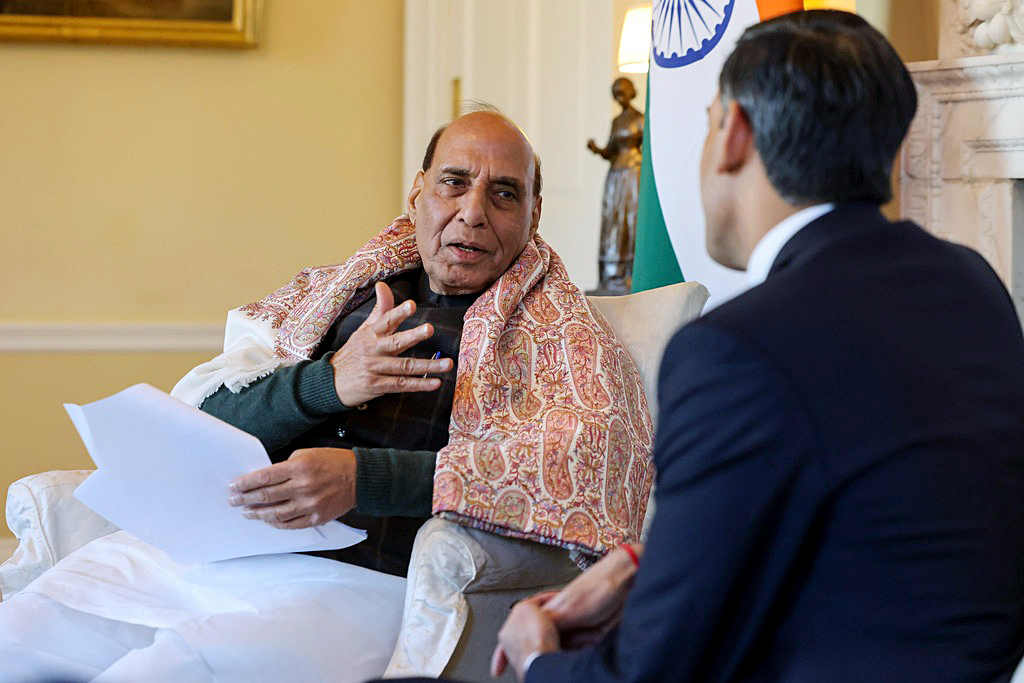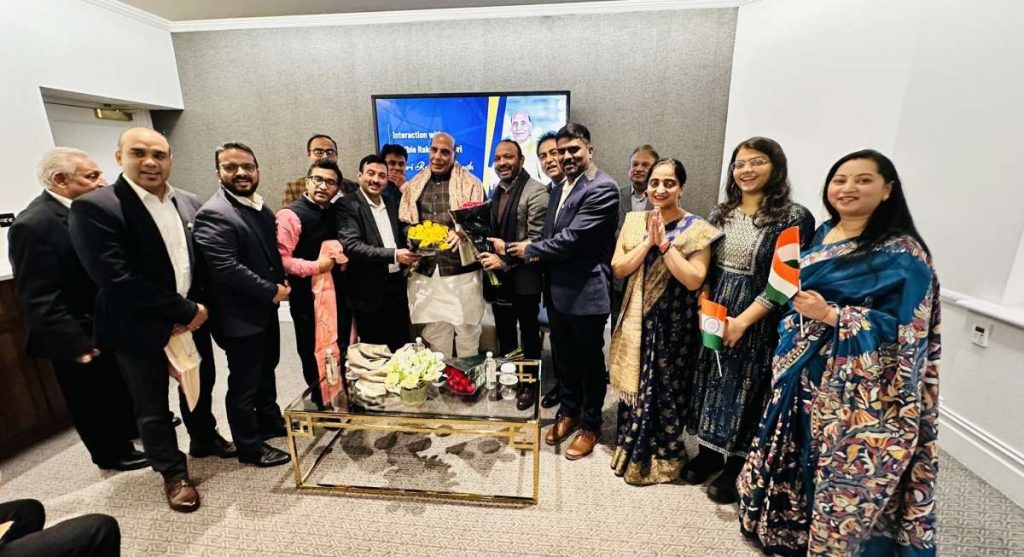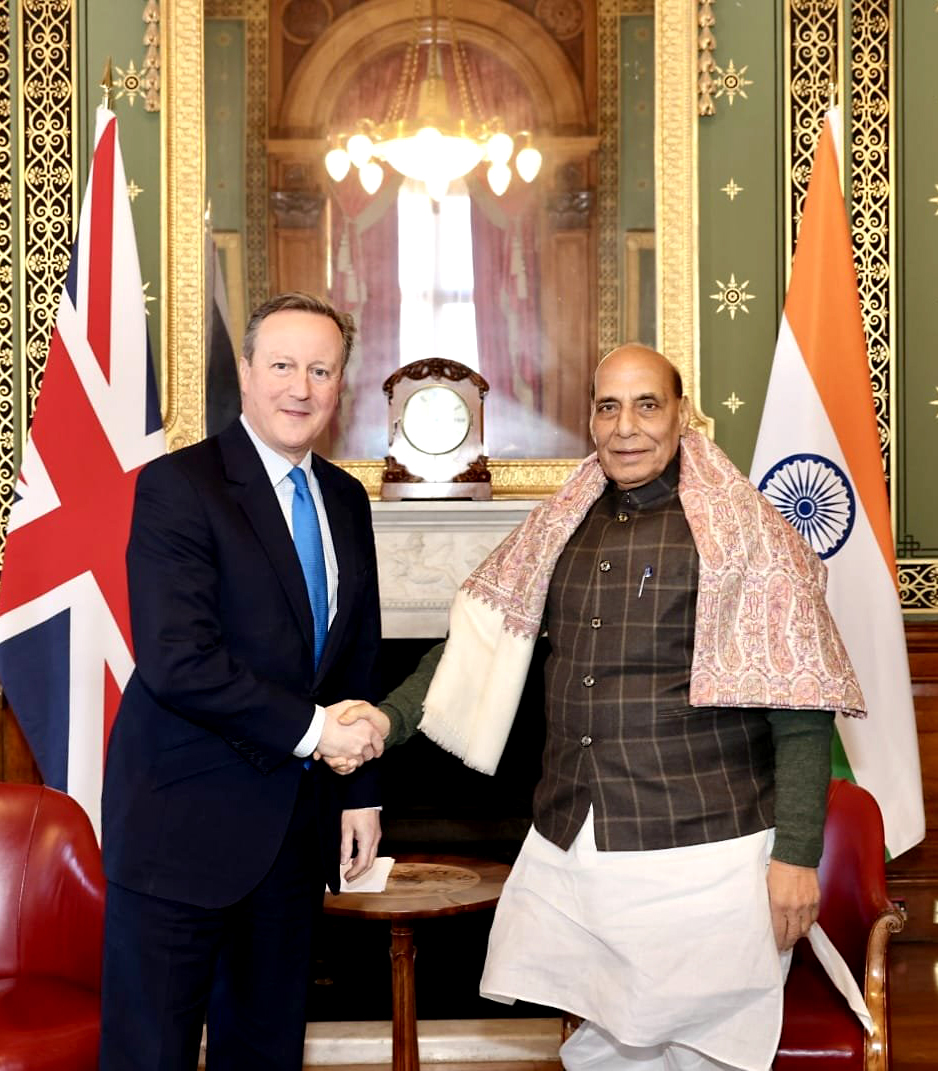Indian Defence Minister Rajnath Singh’s historic visit to the UK has led to the fostering of future collaboration in defence research and manufacturing
Indian Defence Minister Rajnath Singh embarked on a three-day visit to the United Kingdom on January 8, marking a significant milestone in the bilateral partnership between the two nations. The delegation included esteemed figures from the Defence Research and Development Organisation (DRDO), the Service Headquarters, the Department of Defence itself, and the Department of Defence Production. The significance of the visit emerges partly from its rarity since the last Defence minister-level visit from India occurred 22 years ago. Notably, a previous visit planned for June 2022 was postponed by India for undisclosed reasons, adding further anticipation to this engagement.
Beyond holding extensive talks with his UK counterpart, Mr. Singh engaged in symbolic gestures such as inspecting a ceremonial Guard of Honour and visiting memorials to Mahatma Gandhi and Dr B.R. Ambedkar. He also interacted with members of the Indian diaspora, showcasing the multifaceted nature of the trip.
Analysts see this visit as impactful both in its symbolic nature and potential for concrete progress. Rahul Roy-Chaudhury, a Senior Fellow at the International Institute for Strategic Studies, highlighted the visit’s symbolism as the first of its kind in over two decades, further emphasizing the significance of India-UK relations. He also believed that it reflected an improvement in political ties and trust-building, stemming from UK Prime Minister Rishi Sunak’s visit to India for the G20 Summit in 2023.

Substantively, the primary objective of the visit was to deepen military cooperation and defence-industrial partnerships. Building on recent meetings at the Secretary and Joint Secretary levels, both nations seek to bolster collaboration in areas like aero-engines, naval electric propulsion, and ground-based air defence systems. While the UK may not currently be one of India’s top strategic partners, Roy-Chaudhury highlighted the potential for a revitalized technological and industrial partnership through the pursuit of these ongoing projects.
In the late evening of January 8, Mr. Singh touched down in London, initiating a series of activities the following day, starting on Tuesday, January 9. His journey took on a poignant tone as he commenced by paying tribute to Mahatma Gandhi at the statue in Tavistock Square, laying floral tributes that held significant symbolism. Interestingly, this gesture coincided with Pravasi Bharatiya Divas, a day dedicated to honouring Gandhi’s return from South Africa in 1915, adding a layer of historical significance to Mr. Singh’s actions.
Adding to the ceremonial nature of his visit, Mr. Singh received a Guard of Honour at the revered Horse Guards Parade Ground, further underscoring the importance of his presence. Following this formal acknowledgement, he engaged in discussions with his UK counterpart, Grant Shapps.
Their discussions focusing on enhancing defence-industrial collaboration, culminated in the signing of two agreements. One was an MoU for cadet exchange programs and the other was a Letter of Arrangement for joint research and development initiatives between DRDO and DSTL. These Memoranda of Understanding (MoUs) mark a significant step forward in fostering both personal connections between young people and broader cooperation in defence research between our two nations. They will catalyze deeper engagement, promoting exchange programmes and collaborative projects that connect the next generation of leaders in military innovation.
On the next day of his visit, i.e., January 10, the Defence Minister engaged in high-level discussions with leading figures in the UK defence industry. He co-chaired the UK-India Defence Industry CEOs Roundtable in Trinity House, London, alongside his counterpart Mr Grant Shapps. This key gathering brought together CEOs from major UK defence companies like BAE Systems and Thales UK, alongside officials from both nations’ Ministries of Defence, representatives from business councils, and Indian industry leaders.

The Roundtable served as a platform for robust discussions on strengthening the India-UK defence industrial partnership. Shri Rajnath Singh welcomed UK investments and technology collaborations, highlighting India’s skilled workforce, favourable business environment, and vast domestic market. He emphasized India’s ambitious vision for becoming a developed economy by 2047, driven by Prime Minister Modi’s leadership and the collective will of its people. He further stressed the symbiotic nature of the India-UK relationship and the government’s desire to cooperate, co-create, and co-innovate with the UK by leveraging each other’s strengths.
Mr Shapps echoed these sentiments, affirming the strategic nature of the partnership, surpassing mere buyer-seller dynamics. Industry leaders from the UK outlined their plans for future collaboration, focusing on equipment like aero-engines, electric propulsion, and maritime systems. The Defence Minister expressed his appreciation for the enthusiasm and positivity displayed by UK business leaders towards working with India.
In a significant move to strengthen military ties with India, the UK plans to send its specialized Littoral Response Group to the Indian Ocean later this year. This deployment paves the way for an even bigger show of force in 2025, with the UK proposing to send its powerful Carrier Strike Group for joint training exercises with Indian forces. The announcement, made by UK Defence Secretary Grant Shapps, highlights the growing strategic partnership between the two nations and their commitment to maritime security in the region.
Defence Minister Rajnath Singh’s visit to the UK concluded on January 10th with a positive tone. He had a “warm meeting” with Prime Minister Rishi Sunak at 10 Downing Street, where they discussed a broad range of topics related to bilateral defence and economic relations. As a symbolic gesture, Singh presented Sunak, Britain’s first Hindu Prime Minister, with a Ram Darbar statue. Both leaders underscored the importance of close cooperation between their nations, with Sunak voicing his eagerness to bolster the defence and security aspects of the partnership. This includes initiatives to foster stronger business and technology collaborations between Indian and UK entities. Furthermore, they expressed hope for a swift and successful conclusion to the ongoing free trade agreement negotiations, aiming to significantly expand the existing £36 billion bilateral trade relationship. This meeting marks a promising step towards further strengthening the ties between India and the UK.
In his meeting with UK Foreign Secretary David Cameron, Rajnath Singh highlighted the growing strength of the India-UK partnership. Their discussions spanned various levels of engagement, from diplomatic to industrial. Singh expressed his vision for deeper integration, proposing collaboration on building resilient supply chains in both countries’ defence sectors. He also emphasized the potential of fostering ties between budding startups and identifying joint projects for India and the UK to tackle together. Cameron reciprocated, expressing the UK’s keen interest in working with India on defence, particularly in industrial collaboration, as a means to reinforce a rules-based global order. This meeting signifies a renewed commitment and momentum in the India-UK partnership, with both countries eager to explore new avenues for cooperation.
The historic three-day visit of the Indian Defence Minister to the UK, marked a significant moment in bilateral relations. The delegation, including key figures from DRDO and Defence, underscored the visit’s rarity, being the first Defence minister-level engagement in 22 years. Symbolic gestures, such as laying floral tributes at Mahatma Gandhi’s statue and receiving a Guard of Honour, set the tone. Discussions with UK counterpart Grant Shapps resulted in crucial agreements for cadet exchange and joint research initiatives. The visit culminated positively with high-level industry talks, affirming a commitment to defence collaboration, investment, and technological synergy, promising a robust future for India-UK relations.
(Dr. Divya Rani is an Assistant Professor in the Department of Political Science, BHU, Varanasi. She contributes regularly on critical issues of utmost importance)

